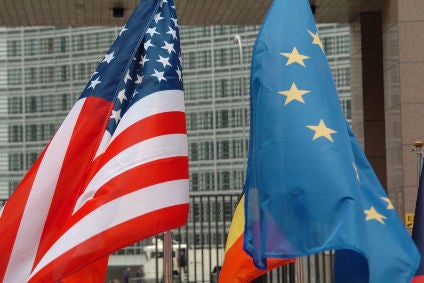
Trade talks under way between the European Union and the US could, as they stand, “hand over Europe’s animal farming sector on a silver platter to transnational meat corporations through tariffs and quota expansions”, according to a new report.
The Institute for Agriculture and Trade Policy (IATP), one of several organisations behind the report published yesterday (13 July), claimed that the “powerful meat industry is aggressively using” the ongoing Transatlantic Trade and Investment Partnership (TTIP) talks “to lower standards that protect public health, and undermine governments’ ability to create essential labour, environmental and animal welfare reforms in the future”.

Discover B2B Marketing That Performs
Combine business intelligence and editorial excellence to reach engaged professionals across 36 leading media platforms.
IATP Europe’s director and report co-author Shefali Sharma said: “The US simply lacks essential rules that should curb the industry’s worse practices that cost taxpayers millions in environmental and public health costs. With TTIP, the EU industry will ensure that pending decisions on critical issues such as cloning, glyphosate and factory farms’ methane emissions are made with trade ‘competitiveness’ in mind and not the public interest.”
Report lead author and former US state legislator Sharon Treat said: “The analysis clearly shows that regulatory processes for key issues that the European and American public care about – from climate change, GMOs, country of origin labelling or future rules on technologies such as gene editing –will be affected. The meat industry will be able to use TTIP to effectively undermine efforts to regulate the negative environmental and public health impacts of their industrialised practices in the future – not just at the EU and federal level, but for EU member states and US states as well.”
The European farmers’ association Copa-Cogeca said yesterday “sticking points” remained in the TTIP talks. Secretary-general Pekka Pesonen said: “Faced with a critical EU agricultural market situation, we want to look ahead and find new opportunities and better access to markets for our products.”
However, Pesonen said: “We want to make sure that the EU’s high quality standards are recognised. We also believe that three quarters of possible gains from a potential deal could come from removing red tape and non-tariff barriers to trade. EU dairy producers for example face big obstacles when trying to market Grade A milk products in the US which effectively stop our exports from entering the US. The same situation applies for our fruit and vegetable exports.”

US Tariffs are shifting - will you react or anticipate?
Don’t let policy changes catch you off guard. Stay proactive with real-time data and expert analysis.
By GlobalDataPesonen said more progress was also urgently needed “on getting recognition of the EU system of geographical indications which protects our quality produce from imitations and misleading consumers”.
A spokesperson for the Brussels-based Liaison Centre for the Meat Processing Industry in the EU (Clitravi) told just-food it had no comment on the report.
US trade representative Michael Froman said last month the US still valued the TTIP with the EU, despite the UK referendum vote to leave the bloc. He said: “The importance of trade and investment is indisputable in our relationships with both the European Union and the United Kingdom. The economic and strategic rationale for TTIP remains strong.”
The fourteenth round of the TTIP talks are taking place this week (11-15 July) in Brussels. This third round of negotiations in six months continues the “very intensive period of talks” which started at the beginning of this year. According to the European Commission, the negotiators will discuss “all three pillars” of TTIP: market access for EU and US firms, regulatory cooperation, and rules of trade.





